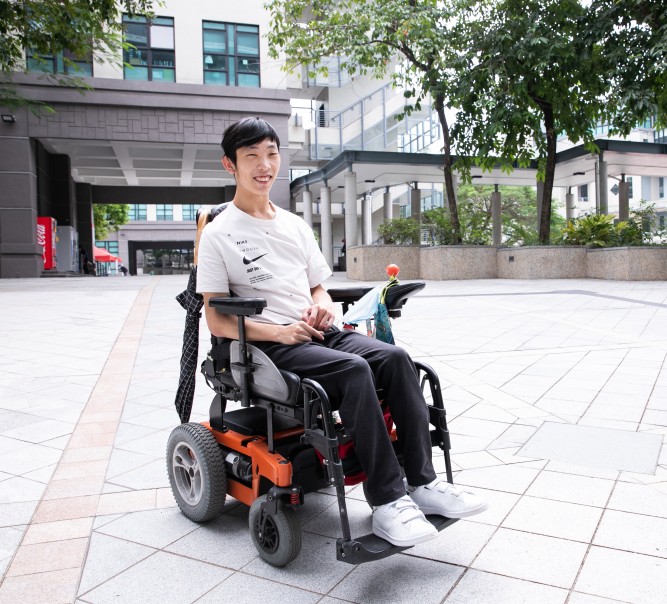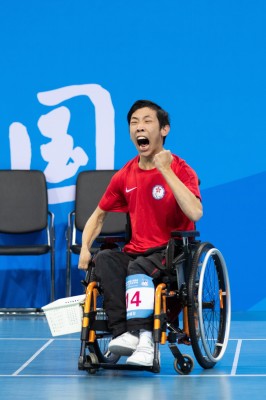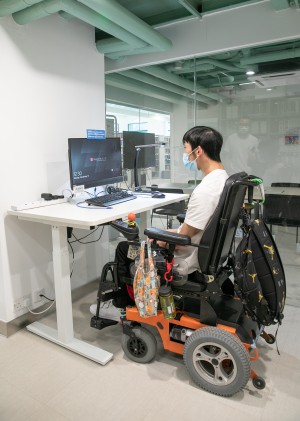Elite student-athlete Ng Chi-hang pursues his dream at LU

In recent years, Hong Kong has been blessed with a wealth of athletic talent, and Siobhan Bernadette Haughey, Edgar Cheung Ka Long, Marco Fu Ka Chun and Sarah Lee Wai Sze are already household names. And there are many more athletes in Hong Kong – full-time, part-time, able-bodied and disabled – who embrace the same Lion Rock spirit, and strive for excellence through hard work and perseverance.
Ng Chi-hang, who joined the Lingnan family this academic year, is an elite boccia player who has competed in numerous local events, and represented Hong Kong in the Asian Para Games in 2014 and the 10th National Para Games and 7th Special Olympics in 2019. "For me, taking part in the Asian Games in 2014 was an unforgettable experience. It was my first time playing a major competition and I had to compete against adults," he said.

Ng Chi-hang represented Hong Kong in the Asian Para Games in 2014 and the 10th National Para Games and 7th Special Olympics in 2019.
Chi-hang started professional training when he was 15 years old, just one year before competing in the 2014 Asian Games. “At my special school, our teachers let us try to play different disability sports. At that time, I had never thought about joining the Hong Kong team or becoming a professional athlete, but I always loved boccia. In 2013, some coaches came to the school to select athletes, and I was chosen to participate in the youth games. That was when I started to train for boccia.” He was thinking about training for fun when he agreed, and “did not expect that it would be so professional” or that he would be so resolute.
Chi-hang was admitted to Lingnan’s Bachelor of Business Administration (Honours) programme through the Direct Entry Stream for Top Athletes, and, as an individual elite athlete at the Hong Kong Sports Institute, he is required to attend at least 15 hours of training per week. Since he joined Lingnan, Chi-hang usually practises from 6 to 9 on Tuesday and Thursday evenings, as well as all day Saturday and all day on alternate Sundays. "I felt quite tired initially with this schedule. Take Tuesdays and Thursdays as an example: class at Lingnan usually ends at 4:30pm. By the time I arrive at the Sports Institute, it is already after 6, so I grab some food at the canteen and then practise until 9 or 9:30, and I don’t get home until at least 11. The pace of life is fast as I have to study and practise, but after I got used to it, I started to think it is not that difficult to cope with," said Chi-hang, who lives in Tuen Mun.

Chi-hang is grateful for Lingnan’s support, and the fact that LU responds to his requirements.
In his nearly 10 years in sport, Chi-hang has experienced ups and downs. While getting resources and securing a place in competitions are becoming more and more fierce, he has managed to stay on and achieve good results. "I had the opportunity to compete in major competitions when I was young and so I tended to think that there would always be plenty of opportunities. But my performance got worse. I once wondered if I should go on playing, and if I would ever win.” He decided to speak to the principal and teachers at his secondary school and to his friends, and it was the encouraging comments from his Physical Education teacher that made him continue: “You have been training for a long time, so why don't you stick with it until you finish secondary school? You can think again then. In any case, this will be good for you in the future.” Chi-hang said: “In 2019, I started to perform better and was among the top eight in the National Games. And since then I have been an elite athlete.”
"With the support I have, I think that if I can manage, I should not give up so easily. Even though I have not had the opportunity to compete in major events in the past few years, I think it is good for me to continue to train. Sport is a way to release stress. When I am playing, I forget the pressure of schoolwork. I enjoy continuously exploring my potential and watching myself improve bit by bit along the way.”
Chi-hang may have to work harder than the others to keep up with his studies, training and competitions though. "It is almost the end of the semester and I have a lot of assignments to work on. Apart from training, I have to study every night. Other students may be able to relax on Saturdays and Sundays, but I cannot. I have to work on assignments every day. I am not as efficient as my fellow classmates, and so I am basically very busy every day.”
Chi-hang is grateful for Lingnan’s support, and the fact that LU responds to his requirements, allowing him flexibility to study, and looking after students with special needs. He recalls that when he first joined, a staff member was assigned to look after him on campus every day, and standing desks were provided in classrooms and the library to make working easier for him. "Like any other student, I can go everywhere on campus by myself, but my training schedule is not easy to accommodate, so the University allows me to choose my subjects and class timetable earlier to cope with the coach's requirements, and this has been very helpful,” he said.
"Sport has enabled me to meet athletes and coaches of all ages, and I have to get along and communicate with different types of people," he said, adding: :It is boccia, and it is this group of people who guide me, who enable me to keep improving, understand my goals and deal with other people. With all this, I myself have changed and become more mature.”
Looking ahead, Chi-hang will continue to train as an athlete, but he hopes to join the business world upon graduation from Lingnan University and contribute to society.

